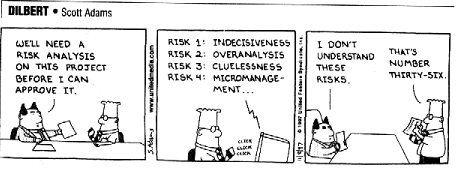
- The Successful Technocrat, by Archibald Putt, from
Research/Development magazine, 1976-1977. Archibald
Putt is the pseudonym (for obvious reasons) of
a person with long experience in observing and analyzing
the always intricate - and often paradoxical - interplay
of personalities in the R&D hierarchy.
- 1: Putt's Law. Beginning
a disquisition on the vagaries of upward mobility
through the ranks of your fellow workers in
today's R&D community - how to do it and what
to do when you get there.
- 2: Three laws of crises. Our
expert on the hierarchical intricacies of the
R&D world discusses the hazards of excessive
perfection and promulgates a trio of governing
conditions for building your own crises.
- 3: The law of failure. In
the R&D world it's "To the loser
belong the spoils" (if you play your cards
right). Our expert on getting ahead tells how,
when failure strikes, you can salvage your career
- 4: The S-curve law. Having
told how to manage projects to best advantage
(yours) Putt now discloses the secret of
selecting the best project (for you) and how to
foresee the best time to get out of it.
- 5: Laws governing values.
Your hierarchical position can be enhanced if
you draw on the abilities of others - but only if
they are of equal or higher rank. Putt provides
the postulational principles to prove it.
- 6: Three laws of advice. Some
readers may be familiar with the First Law of
Advice, but the Second and Third Laws are neither
so well-known nor so obvious, so our expert
provides two illustrative examples to show how
they work.
- 7: The consultant's law. If
you've ever dreamed of becoming a consultant,
read this advice from our expert on the
hierarchiology of technology; two examples show
how the Consultant's Law works and why you can't
ignore it.
- 8: Laws of survival. Our
expert has already told us the ploys for getting
ahead in the hierarchy of technology, but you
can't get ahead if you've been kicked off the
team; here's how to make sure you're not.
- 9: Five laws of
decision-making. Our intrepid explorer of
the technological hierarchy looks at the complex
process of making up the corporate mind; he
finds, and sets down here, five rules that should
be invaluable to the upward-oriented
technologist.
- 10: Laws of reward and
punishments. If your organization is in a
state of malevolent stagnation, as defined here
by our hierarchiologist, there's little hope-but
you should at least read his remarks to find out
how you got there.

